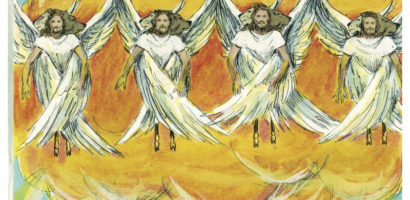
An ultra-Orthodox man recites Psalms at the Western Wall, Jerusalem. Photo courtesy of Wikimedia Commons
The Hebrew Bible is full of poetic language that to be truly savored must be read – preferably aloud – in the original Hebrew. Nowhere can the music of Biblical Hebrew be felt more than in the Book of Psalms. In the days when the Temple stood in Jerusalem, many of the psalms were actually sung by the Levitical choir as a musical accompaniment to the sacrifices. Others were sung by common people. The collection of psalms known as the “songs of ascent” (Psalms 120-134), in particular, is thought have been sung by pilgrims as they ascended to Jerusalem. This means that reciting the psalms today in the original Hebrew is one of the best ways to be transported back to the authentic atmosphere of the Temple.
In this post I want to take a look at two seemingly commonplace words which occur in several of the psalms. The words are shir hadash (שיר חדש), which means a “new song.” For example, Psalm 98 opens with these words:
“Sing a new song to the Lord. For He has done great things.” (Ps. 98:1)
שִׁירוּ לַיהוָה שִׁיר חָדָשׁ כִּי-נִפְלָאוֹת עָשָׂה
It also appears in Psalms 33:3, 40:3, 96:1, 144:9, 149:1.
What is the meaning of the phrase “new song”? How is a new song different from a regular song? What is the opposite of a new song? The Hebrew adjective hadash (“new”) appears dozens of times in the Bible, almost always in the obvious sense of not old. It can be applied to any number of nouns, for example: “a new king” (Ex. 1:8), “a new house” (Deut. 20:5), “a new covenant” (Jer. 31:22). Singing a “new song” means praising God’s name with a rejuvenated sense of enthusiasm, not reciting the same old words in a sluggish, uninspired manner. The use of the phrase “new song” is most often is associated with the genre of psalm known as the “song of victory”. An example of this type of song outside the Book of Psalms is found in Isaiah chapter 42:10-17, which opens which these words:
“Sing to the Lord a new song, his praise from the end of the earth!” (Isa. 42:10)
שִׁירוּ לַיהוָה שִׁיר חָדָשׁ, תְּהִלָּתוֹ מִקְצֵה הָאָרֶץ
Interestingly, in the verses which follow, Isaiah emphasizes very clearly that the antithesis of “singing a new song” is not “singing and old song”, but rather simply “keeping quiet”:
“For a long time I have held my peace, I have kept still and restrained myself” (Isa. 42:14)
הֶחֱשֵׁיתִי, מֵעוֹלָם–אַחֲרִישׁ, אֶתְאַפָּק
In this verse and twice more in the same chapter, Isaiah uses the verb heresh (חרש), meaning “to keep silent”. These two occurrences are found in the context of an extended allegory in which the children of Israel are compared a blind and deaf person unable to appreciate God’s favor.
Listen, you who do not hear! And look, you blind, that you may see. Who is blind but My servant? Who does not hear, as the one whom I send with news? Who is so blind as he who is at peace with Me, or so blind as the servant of the Lord? (Isa. 42:18-19)
הַחֵרְשִׁים, שְׁמָעוּ; וְהַעִוְרִים, הַבִּיטוּ לִרְאוֹת
מִי עִוֵּר כִּי אִם-עַבְדִּי, וְחֵרֵשׁ כְּמַלְאָכִי אֶשְׁלָח; מִי עִוֵּר כִּמְשֻׁלָּם, וְעִוֵּר כְּעֶבֶד יְהוָה.
I think that Isaiah’s use of the root heresh three times in this chapter is not accidental. The words heresh (חרש) and hadash (חדש) look very similar when written in Hebrew. The only difference between them is the letters resh (ר) and dalet (ד) which have very similar visual forms. Both in the modern square Hebrew script of the post-Exilic period (used today) and in the ancient Hebrew script of the pre-exilic period these two letters look very similar.
By repeating heresh three times in chapter 42, Isaiah is underscoring the real meaning of the Hebrew phrase “new song”, shir hadash (שיר חדש). This is a clever pun on shod heresh (שוד חרש) which means a “silent ruin”. The implication is that opposite of singing fresh words of praise is decomposing in silence. The new song is new because it keeps the singer vibrant. Although the exact phrase shod heresh never appears in the Bible, Isaiah uses the word shod (= desolation, havoc, ruin) many times (13:6; 16:4; 22:4; 51:19; 59:7; 60:18) and heresh many times as well (36:21; 41:1; 42:14; 42:18; 42:19). In my estimation, the point of this is that Hebrew letters themselves emphasize that in order for prayer to be worthy it cannot be inaudible or tainted; it must be intoned in an uncorrupted manner. But one must always be cognizant of the delicate boundary between these two realities, which are separated only by the tiniest of scribal strokes.





So we must sing even if we are very bad singers?
I ask God to sing and He sings incredibly beautiful by His acts.